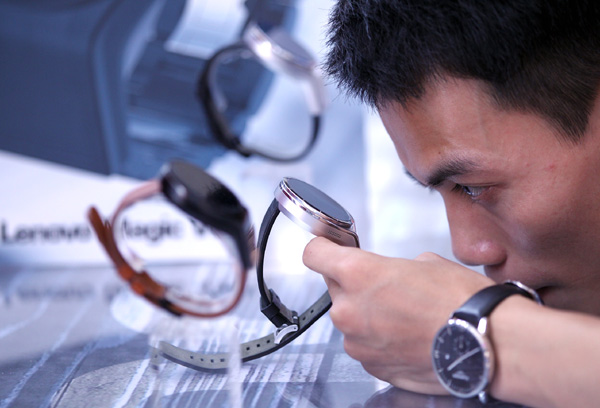Fix macro disconnect to boost consumption
Updated: 2015-12-28 09:10
By Stephen Roach(China Daily)
|
|||||||||
 |
|
A visitor takes a close look at the smartwatch unveiled by Lenovo Group Ltd in Beijing, May 28, 2015. [Photo/China Daily] |
Structural change and rebalancing are formidable undertakings for any economy. China has been focused on these objectives for five years - seeking to transform a powerful yet unbalanced growth model based largely on exports and investment into one driven increasingly by its consumers. Success is essential if China is to avoid the dreaded "middle-income trap" - the economic slowdown that most fast-growing developing economies experience when they reach income thresholds comparable to that of China today.
The results have been mixed. China has been highly successful in its initial efforts to shift the industrial structure of its economy from manufacturing to services, which have long been viewed as the foundation of modern consumer societies. But it has made far less progress in boosting private consumption. China now has no choice but to address this disconnect head on.
The performance of China's services sector has been especially impressive in recent years, with its share of GDP increasing from 44 percent in 2010 to 51.6 percent in the first three quarters of 2015, according to official statistics. That is nearly double the 4-percentage-point increase that was initially envisioned in the 12th Five-Year Plan (2011-15), which is about to come to an end.
The gains have been particularly strong in the distribution sectors - wholesale and retail trade - as well as in finance and real estate. And China's shift to services has only just begun. It should broaden into information technology services, healthcare, domestic transportation, and hospitality and leisure, as the sector as a whole climbs toward a 60-65 percent share of GDP over the next decade.
By contrast, consumer-led growth has been much slower to materialize. After bottoming out at 36 percent of GDP in 2010, private consumption's share of GDP inched up to 38 percent in 2014 - a 2-percentage-point increase that is only about one-fourth the magnitude of the services-led shift in the economy's structure.
With its prowess in central planning, China has always been adept at engineering shifts in its industrial structure - as the move toward services-led growth attests. But China apparently is far less proficient in replicating the DNA of a modern consumer culture - specifically, in altering the behavioral norms of its people.
The disconnect between surging services and lagging growth in private consumption has been accompanied by a steady rise in China's urban saving rate to 30 percent in 2014 (versus 24 percent a decade earlier). This has occurred despite a significant increase in the personal income share of the Chinese economy, driven by services-led employment growth and the income leverage of urbanization. Chinese families have been reluctant to convert much of this newfound income into discretionary spending.
Related Stories
Post 80s consumers critical in economic transition toward consumption 2015-12-22 15:41
China pins growth hopes on consumption, service 2015-12-07 10:58
Balancing investment and consumption 2015-12-07 08:54
Most Chinese luxury consumption happens overseas: report 2015-11-25 10:20
China rolls out consumption-boosting measures 2015-11-23 17:22
Record online sales show robust consumption in China 2015-11-12 17:20
Today's Top News
Inspectors to cover all of military
Britons embrace 'Super Thursday' elections
Campaign spreads Chinese cooking in the UK
Trump to aim all guns at Hillary Clinton
Labour set to take London after bitter campaign
Labour candidate favourite for London mayor
Fossil footprints bring dinosaurs to life
Buffett optimistic on China's economic transition
Hot Topics
Lunar probe , China growth forecasts, Emission rules get tougher, China seen through 'colored lens', International board,
Editor's Picks

|

|

|

|

|

|







